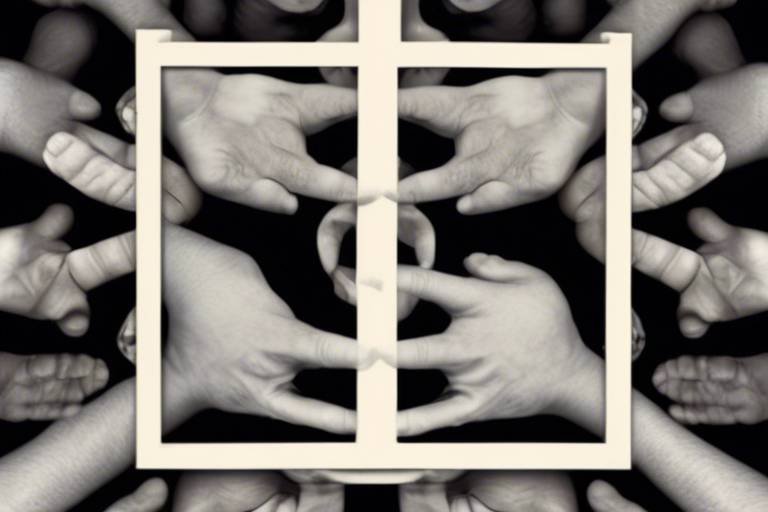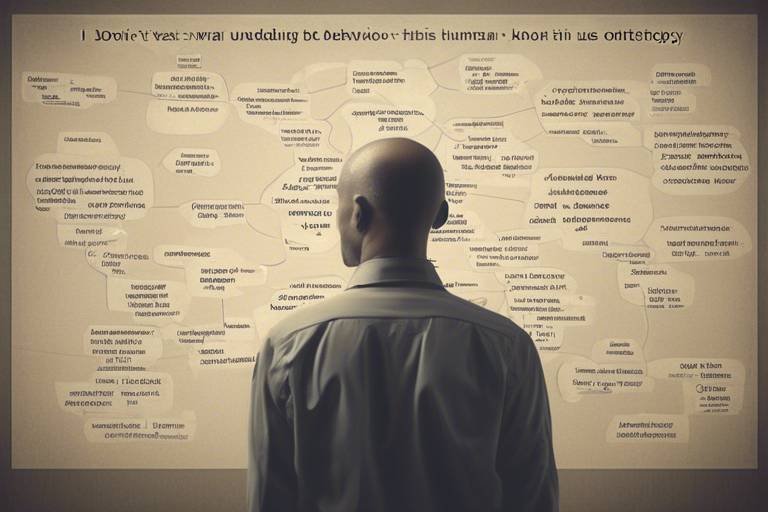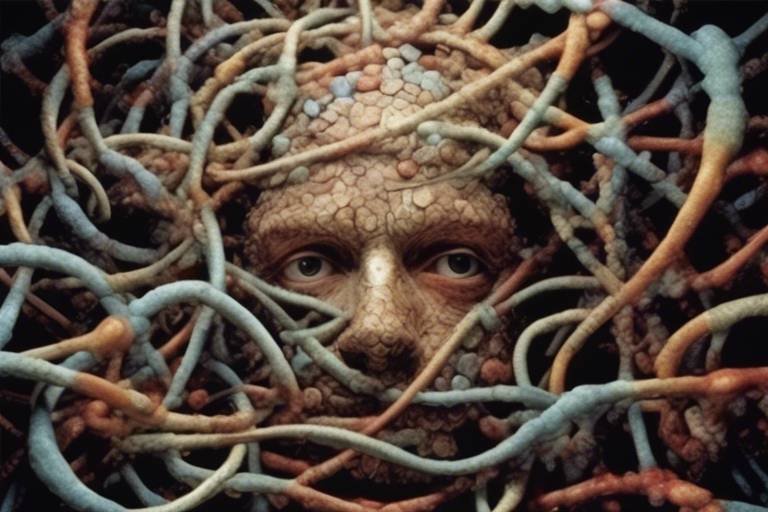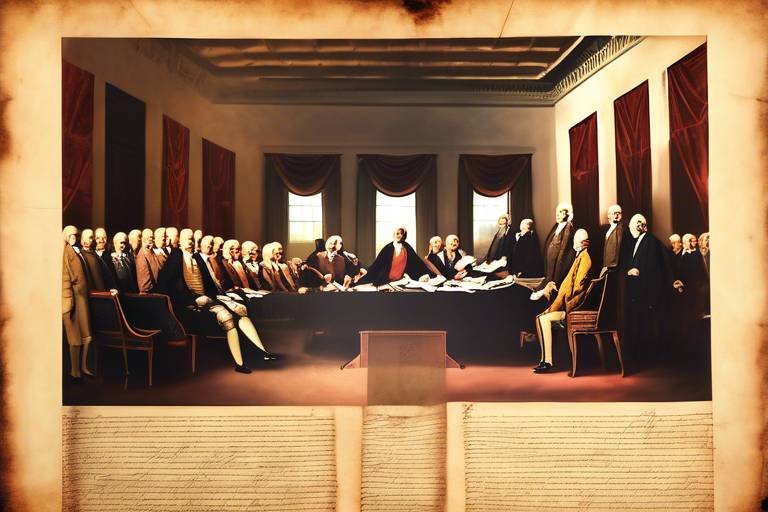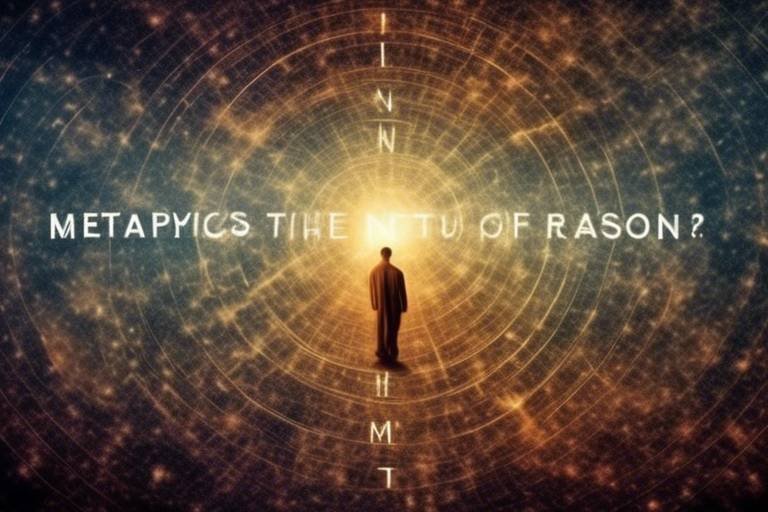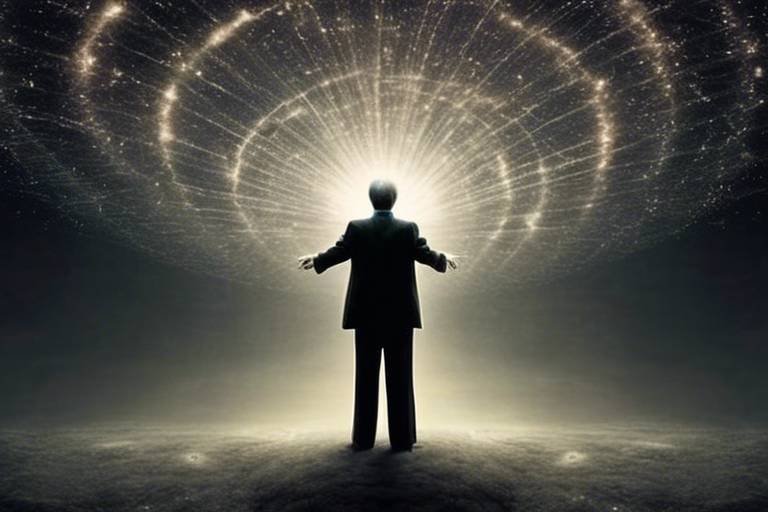Interpreting the Ontological Equality Theory
The concept of Ontological Equality Theory is a fascinating and profound exploration of the idea that all individuals possess an inherent and equal worth simply by being human. This theory challenges us to rethink our understanding of value, dignity, and justice in both personal and societal contexts. Imagine a world where every person, regardless of their background, is recognized as having equal significance. This is the essence of Ontological Equality, a principle that resonates deeply in philosophical, ethical, and social justice discussions.
At its core, Ontological Equality Theory asserts that every human being has an intrinsic value that cannot be diminished by external factors such as race, gender, or socioeconomic status. This notion has profound implications for how we interact with one another and how we structure our societies. It encourages us to foster a culture of respect and empathy, urging us to see beyond superficial differences and recognize the shared humanity that binds us all.
Historically, the seeds of Ontological Equality can be traced back to various philosophical movements that sought to elevate the status of individuals. Think about the Enlightenment, where thinkers like Kant emphasized the importance of human dignity and the moral worth of individuals. These ideas laid the groundwork for contemporary discussions around equality and rights.
As we delve deeper into Ontological Equality, we uncover its relevance in today's world. In an era marked by social injustice and inequality, the principles of this theory serve as a beacon of hope, guiding movements aimed at dismantling systemic discrimination and advocating for the rights of marginalized groups. The fight for equality and equity is not just a political endeavor; it's a moral imperative rooted in the belief that every person deserves to be treated with dignity and respect.
In summary, Ontological Equality Theory invites us to engage in a transformative dialogue about our values and responsibilities towards one another. By embracing the idea that each individual holds intrinsic worth, we can pave the way for a more just and equitable society. This theory is not merely an abstract concept; it is a call to action, urging us to reflect on our beliefs and practices in a world that desperately needs change.
- What is Ontological Equality Theory? - Ontological Equality Theory posits that all individuals possess equal intrinsic value, regardless of their characteristics or circumstances.
- Why is intrinsic value important? - Recognizing intrinsic value influences ethical decision-making, promoting respect and dignity in interpersonal relationships.
- How does Ontological Equality relate to social justice? - The theory serves as a foundation for advocating equality and fighting against discrimination, emphasizing the moral responsibility to uphold human dignity.
- What are some critiques of Ontological Equality Theory? - Critics argue about its feasibility in diverse societies and question its effectiveness in addressing complex social issues.
- What is the future of Ontological Equality? - The future may involve integrating Ontological Equality with modern ethical frameworks and applying its principles globally to foster solidarity.

Historical Context of Ontological Equality
The roots of Ontological Equality Theory stretch deep into the rich soil of philosophical thought, intertwining with various movements and ideas that have shaped our understanding of what it means to be human. This theory posits that all individuals possess an intrinsic worth that is independent of their social status, abilities, or any subjective measures of value. To truly grasp the significance of Ontological Equality, we must first explore its historical context and the thinkers who contributed to its evolution.
One of the earliest proponents of ideas resembling Ontological Equality can be traced back to the Enlightenment period, where philosophers like Immanuel Kant emphasized the inherent dignity of individuals. Kant's concept of the "categorical imperative" urged that we treat humanity, whether in ourselves or others, always as an end and never merely as a means to an end. This foundational principle laid the groundwork for later discussions surrounding human rights and equality.
As we moved into the 19th century, the abolitionist movement gained momentum, further advocating for the recognition of the intrinsic value of every human being, regardless of race or social class. Figures such as Frederick Douglass and Sojourner Truth challenged prevailing notions of human worth, arguing that the rights of individuals should not be contingent on their background or circumstances. Their activism highlighted the moral imperative to acknowledge and uphold the dignity of all people, which is a core tenet of Ontological Equality.
In the 20th century, the aftermath of World War II and the horrors of the Holocaust prompted a global reckoning with human rights. The establishment of the Universal Declaration of Human Rights in 1948 marked a significant milestone in affirming the principle that all human beings are born free and equal in dignity and rights. This document encapsulated the essence of Ontological Equality, reinforcing the idea that every individual deserves respect and recognition simply by virtue of being human.
Throughout history, various philosophical movements have contributed to the discourse surrounding Ontological Equality. For instance, existentialism and postmodernism have both offered critiques and expansions on the notion of individual worth, challenging traditional hierarchies and advocating for a more inclusive understanding of equality. Moreover, contemporary movements such as feminism and LGBTQ+ rights have further pushed the boundaries of Ontological Equality, emphasizing that dignity and worth are universal and should be recognized across all identities and experiences.
In summary, the historical context of Ontological Equality is a tapestry woven from the threads of enlightenment thought, social justice movements, and human rights advocacy. It is a testament to humanity's ongoing struggle to recognize and affirm the intrinsic value of every individual, regardless of their circumstances. As we continue to navigate the complexities of modern society, understanding this historical backdrop is crucial for appreciating the contemporary relevance of Ontological Equality Theory.

Key Principles of Ontological Equality
At the heart of Ontological Equality Theory lies a tapestry of fundamental tenets that weave together the fabric of human existence and our shared moral obligations. This theory posits that all individuals possess an inherent worth that is not contingent on external factors such as race, gender, or social status. In essence, it suggests that every person has a unique value simply by being human. This idea challenges us to rethink our interpersonal relationships and societal structures, urging us to foster environments where everyone is treated with respect and dignity.
One of the most significant concepts within Ontological Equality is the notion of intrinsic value. This principle asserts that every individual has worth that is inherent and not dependent on their contributions or achievements. Just like how a diamond holds value regardless of its setting, each person is valuable in their own right. This perspective profoundly influences ethical decision-making, compelling us to consider the implications of our actions on others. When we recognize the intrinsic value of individuals, we begin to see a shift in how we engage with one another, leading to more compassionate and equitable interactions.
Delving deeper into the intrinsic value of individuals, we find that this recognition is not just an abstract idea but a practical guide for ethical behavior. For instance, in healthcare, acknowledging the intrinsic value of every patient can lead to more humane and equitable treatment. It pushes healthcare providers to prioritize patient dignity over profit margins or efficiency metrics. This principle can also be seen in educational settings, where recognizing each student's unique worth fosters an inclusive environment that nurtures diverse talents and perspectives.
Understanding how intrinsic value shapes ethical frameworks is crucial. Various ethical theories, such as Kantian ethics, emphasize the importance of treating individuals as ends in themselves rather than means to an end. This philosophical approach aligns seamlessly with Ontological Equality, reinforcing the idea that every person deserves respect and consideration. By adopting this perspective, we can cultivate moral responsibilities that extend beyond mere legal obligations, encouraging a culture of empathy, understanding, and mutual respect.
However, the concept of intrinsic value is not without its critiques. Some argue that it may overlook the complexities of human experience, particularly for marginalized groups who have historically been devalued. Critics question whether intrinsic value can be universally applied when systemic inequalities exist. These challenges compel us to engage in deeper conversations about how we define worth and how societal structures can either uphold or undermine the intrinsic value of individuals. While the theory provides a hopeful framework, it also necessitates a critical examination of its applications in real-world contexts.
Another cornerstone of Ontological Equality Theory is the principle of human dignity. This concept is pivotal in discussions surrounding human rights, as it serves as the foundation upon which rights are built. When we affirm the dignity of every individual, we inherently support the idea that everyone is entitled to certain rights and freedoms. This understanding is crucial in policy-making and justice, as it guides lawmakers to create systems that protect and promote the dignity of all citizens. It reminds us that justice is not merely about punishment but about recognizing the humanity in each person.
In conclusion, the key principles of Ontological Equality invite us to reconsider our views on worth, dignity, and ethical responsibility. By embracing these ideas, we can work towards a more just and equitable society, where every individual is recognized for their intrinsic value and treated with the respect they deserve. As we navigate the complexities of human interactions and societal structures, these principles serve as a guiding light, illuminating the path towards a more inclusive and compassionate world.
- What is Ontological Equality? - Ontological Equality is the theory that all individuals possess inherent worth, regardless of their circumstances or characteristics.
- How does Ontological Equality influence ethical decision-making? - It encourages individuals to consider the intrinsic value of others, leading to more compassionate and equitable interactions.
- What role does human dignity play in Ontological Equality? - Human dignity is fundamental to the theory, underpinning human rights discourse and influencing policy-making.
- Are there critiques of Ontological Equality? - Yes, some critiques focus on its applicability in diverse societies and the challenges faced by marginalized groups.
- How can Ontological Equality be applied in contemporary social justice movements? - It serves as a framework for advocating equality and equity, guiding efforts to combat discrimination.

Intrinsic Value of Individuals
The concept of intrinsic value is at the heart of Ontological Equality Theory, emphasizing that every individual possesses an inherent worth that is not contingent upon external factors such as wealth, status, or societal contributions. This notion challenges us to view each person as an end in themselves, rather than merely a means to an end. Imagine a world where every person is seen as a unique thread in the fabric of society, each contributing to the overall tapestry of human experience. This perspective fosters a profound respect for human life and dignity, encouraging ethical decision-making that prioritizes the well-being of individuals.
Recognizing intrinsic value influences our ethical frameworks significantly. When we acknowledge that every individual has worth, it shapes our interactions and responsibilities towards one another. For instance, in contexts such as healthcare, education, and social services, this recognition compels us to advocate for policies that ensure equitable access and opportunities for all. It pushes us to question systemic inequalities and strive for a society where everyone can thrive, regardless of their background or circumstances.
However, the idea of intrinsic value is not without its challenges. Critics argue that the concept can be too abstract, leading to difficulties in practical application. For example, in diverse societies where cultural values may differ, how do we ensure that the intrinsic worth of individuals is respected universally? This leads us to consider various perspectives and the importance of dialogue in understanding and affirming each person's value, especially for marginalized groups who often face systemic devaluation.
To illustrate this, we can consider the following points:
- Human Rights: The acknowledgment of intrinsic value lays the groundwork for human rights discourse, asserting that every person deserves respect and dignity.
- Interpersonal Relationships: Recognizing the intrinsic worth of others enhances empathy and compassion in our relationships, leading to more meaningful connections.
- Societal Structures: When societies embrace the principle of intrinsic value, they are more likely to develop systems that promote equality and justice for all individuals.
In summary, the intrinsic value of individuals is a pivotal element of Ontological Equality Theory. It not only shapes our ethical perspectives but also has far-reaching implications for how we structure our societies and treat one another. As we navigate the complexities of modern life, embracing this concept can lead to a more just and equitable world, where every individual is valued for who they are, not just what they can contribute.
- What is intrinsic value? Intrinsic value refers to the inherent worth of an individual that exists independently of external factors.
- How does intrinsic value relate to human rights? Recognizing intrinsic value is fundamental to human rights, as it asserts that every person deserves dignity and respect.
- Can intrinsic value be universally applied? While the concept aims for universality, cultural differences can challenge its application, necessitating dialogue and understanding.

Impacts on Ethical Frameworks
The concept of Ontological Equality significantly influences various ethical frameworks, shaping how we perceive our moral obligations to one another. At its core, Ontological Equality posits that every individual possesses an intrinsic value that is independent of their social status, race, gender, or any other characteristic. This fundamental idea compels us to reevaluate traditional ethical theories, pushing them towards a more inclusive and equitable approach. For instance, utilitarianism, which often prioritizes the greatest good for the greatest number, can be challenged by the assertion that the rights and dignity of the individual must not be sacrificed for collective benefit. In this light, ethical decision-making becomes a balancing act, requiring us to consider both individual rights and collective outcomes.
Moreover, deontological ethics, which emphasizes duties and rules, aligns closely with Ontological Equality through its insistence on treating individuals as ends in themselves, rather than as means to an end. This perspective reinforces the notion that every person deserves respect and dignity, regardless of their circumstances. Ethical frameworks that incorporate Ontological Equality encourage us to foster environments where every individual can thrive, thereby promoting social justice and human rights. As we navigate complex moral dilemmas, the intrinsic value of individuals serves as a guiding principle, reminding us that our choices have profound implications on the lives of others.
However, the integration of Ontological Equality into ethical frameworks is not without its challenges. Critics argue that while the theory is noble in intention, its practical application can be complicated in a world rife with inequality and systemic oppression. For instance, when addressing issues such as poverty or discrimination, the challenge lies in ensuring that the principles of Ontological Equality are not merely theoretical ideals but are actively reflected in our policies and practices. This necessitates a critical examination of our ethical commitments and a willingness to adapt our frameworks to better serve those who are marginalized.
In summary, the impacts of Ontological Equality on ethical frameworks are profound and multifaceted. They encourage a shift towards recognizing the inherent worth of every individual, fostering a more just and equitable society. As we continue to explore these ideas, it becomes increasingly clear that the journey towards ethical integrity is ongoing, requiring constant reflection and adaptation to the realities of our world.
- What is Ontological Equality? Ontological Equality is the philosophical concept that all individuals possess inherent worth and dignity, regardless of their social or personal circumstances.
- How does Ontological Equality influence ethical decision-making? It encourages a focus on the intrinsic value of individuals, promoting ethical frameworks that respect and uphold human rights.
- What are some challenges to implementing Ontological Equality? Critics point out the complexities of applying these principles in societies with systemic inequalities and diverse cultural perspectives.
- Can Ontological Equality be integrated with modern ethical theories? Yes, it can enhance existing theories like utilitarianism and deontology by emphasizing individual rights alongside collective well-being.
- What is the significance of human dignity in this context? Human dignity is a cornerstone of Ontological Equality, underpinning discussions around human rights and ethical responsibilities towards others.

Challenges to Intrinsic Value
While the concept of intrinsic value is a cornerstone of Ontological Equality Theory, it is not without its challenges and critiques. One of the primary arguments against intrinsic value is its perceived universality. Critics argue that the idea that all individuals possess inherent worth can be problematic, especially in diverse societies where cultural interpretations of value differ significantly. For instance, what one culture may deem as a fundamental human right, another may view as inconsequential. This raises the question: can intrinsic value truly be considered a universal principle, or is it merely a Western construct?
Moreover, the application of intrinsic value can sometimes lead to unintended consequences, particularly when it comes to marginalized groups. For example, some argue that the focus on individual worth can overshadow systemic issues that affect entire communities. In this context, the emphasis on individualism may inadvertently ignore the collective struggle for equality, leading to a form of ethical elitism where only certain individuals are recognized for their value based on societal standards. This creates a paradox: while we strive to uphold the intrinsic value of every person, we may simultaneously perpetuate inequalities by failing to address the broader societal structures that diminish that value for specific groups.
Another significant challenge lies in the practical application of intrinsic value in policy-making and social justice initiatives. Policymakers often grapple with how to translate the abstract notion of intrinsic value into concrete actions that address real-world inequalities. For instance, in a legal context, how do we ensure that every individual's intrinsic worth is recognized in a system that often prioritizes economic status or social power? This dilemma highlights the tension between philosophical ideals and the messy realities of governance and social interaction.
Additionally, there are critiques that suggest a reliance on intrinsic value can lead to moral absolutism, where certain behaviors or lifestyles are deemed more valuable than others. This can create a hierarchy of worth among individuals, contradicting the very essence of Ontological Equality. In this view, the challenge becomes not just about recognizing individual value, but also about ensuring that this recognition does not devolve into a form of judgment that marginalizes those who do not conform to prevailing social norms.
In summary, while the notion of intrinsic value is fundamental to Ontological Equality Theory, it faces significant challenges that warrant careful consideration. The complexities of cultural differences, systemic inequalities, practical applications, and the potential for moral absolutism all contribute to a rich but contentious discourse surrounding this concept. As we continue to explore these challenges, it becomes clear that a nuanced understanding of intrinsic value is essential for fostering a more equitable society.
- What is intrinsic value? Intrinsic value refers to the inherent worth of an individual, independent of external factors such as social status or economic contributions.
- Why is intrinsic value important in Ontological Equality Theory? It serves as a foundational principle that asserts every individual deserves equal respect and moral consideration.
- What are some critiques of intrinsic value? Critics argue that it may not be universally applicable, can overshadow collective struggles, and may lead to moral absolutism.
- How does intrinsic value impact social justice movements? Recognizing intrinsic value can empower movements by affirming the worth of marginalized groups, though it also raises questions about practical implementation.

Human Dignity and Rights
Human dignity is a cornerstone of Ontological Equality Theory, serving as the bedrock upon which the entire structure of human rights is built. When we talk about human dignity, we are essentially acknowledging the intrinsic worth of every individual, regardless of their background, beliefs, or circumstances. This recognition is not merely a philosophical concept; it has profound implications for how societies function and how we treat one another. The idea that every person deserves to be treated with respect and honor is what fuels movements for justice and equality across the globe.
At its core, human dignity posits that every individual has an inherent value that must be recognized and protected. This principle is echoed in various international documents, such as the Universal Declaration of Human Rights, which states that "all human beings are born free and equal in dignity and rights." This declaration is not just a collection of lofty ideals; it is a call to action, urging nations and individuals alike to ensure that every person can live a life of dignity and respect.
Moreover, the implications of human dignity extend far beyond mere rhetoric. They influence policy-making, guiding laws and regulations that aim to protect individuals from discrimination and abuse. For instance, legislation aimed at protecting marginalized groups often stems from the understanding that their dignity must be upheld. This is particularly crucial in areas such as healthcare, education, and employment, where individuals should not face barriers based on their identity or status.
However, the concept of human dignity is not without its challenges. There are ongoing debates about what constitutes dignity and how it can be universally applied. Different cultures and societies may have varying interpretations of dignity, leading to tensions and conflicts. For instance, what one culture views as a fundamental right may be perceived differently in another context. This raises important questions: How do we navigate these differences while still advocating for universal human rights? Can we find common ground that respects cultural diversity while promoting the inherent dignity of all individuals?
To address these questions, it is essential to engage in open dialogues that respect diverse perspectives while emphasizing the shared values that underpin human dignity. This dialogue can lead to a more nuanced understanding of rights and responsibilities, fostering a global community that prioritizes dignity for all. As we explore the intersections of human dignity and rights, we must remain vigilant in our efforts to combat injustices and advocate for those whose rights are often overlooked.
- What is the relationship between human dignity and human rights?
Human dignity is the foundation of human rights, asserting that every individual deserves respect and protection regardless of their circumstances. - How does cultural diversity impact the understanding of human dignity?
Cultural differences can lead to varying interpretations of dignity, necessitating respectful dialogues to find common ground while honoring diverse perspectives. - Why is human dignity important in policy-making?
Policies that uphold human dignity help protect individuals from discrimination and ensure equitable access to resources and opportunities.

Contemporary Applications
The principles of Ontological Equality Theory are not just abstract ideas confined to philosophical discourse; they are actively shaping our world today. As we navigate through various social justice movements, the essence of this theory can be seen influencing the fight for equality, equity, and the relentless battle against discrimination. Imagine a world where every individual is recognized for their inherent worth, where policies and practices reflect the belief that every person deserves respect and dignity. This is not just a dream; it is a reality that Ontological Equality aims to create.
In recent years, we have witnessed significant movements that embody the core tenets of Ontological Equality. For instance, the Black Lives Matter movement has brought to the forefront issues of systemic racism and the need for equitable treatment across all societal sectors. By advocating for the intrinsic value of every individual, this movement challenges the status quo and pushes for reforms that recognize the dignity of marginalized communities. Similarly, the LGBTQ+ rights movement emphasizes the need for recognition and respect for all identities, advocating for policies that ensure equal rights and protections under the law.
Furthermore, the #MeToo movement has highlighted the importance of recognizing the intrinsic worth of individuals, particularly in the context of gender equality and sexual harassment. This movement underscores the necessity of listening to survivors and validating their experiences, thereby reinforcing the idea that every person's dignity must be upheld. These movements are not just about fighting for rights; they are about reshaping societal norms to reflect a deeper understanding of our shared humanity.
When we look at the policy implications of Ontological Equality, we see a growing trend towards legislation that seeks to address inequalities. For example, many countries are implementing policies aimed at closing the gender pay gap, promoting equal access to education, and ensuring healthcare is available to all, regardless of socioeconomic status. These initiatives reflect a commitment to creating systems that recognize and uphold the intrinsic value of every individual. The challenge, however, lies in the execution of these policies, as they often require a fundamental shift in societal attitudes and institutional practices.
In conclusion, the contemporary applications of Ontological Equality Theory are vast and varied. They challenge us to rethink our approaches to social justice and compel us to advocate for systems that truly reflect the belief in the inherent worth of every person. As we move forward, it is crucial to remain vigilant and proactive in ensuring that these principles are not only recognized but also implemented in ways that foster genuine equality and dignity for all.
- What is Ontological Equality Theory? Ontological Equality Theory posits that all individuals possess intrinsic value and dignity, which should be recognized and respected in all aspects of life.
- How does Ontological Equality apply to social justice movements? It provides a framework for advocating equality and fighting against discrimination by emphasizing the inherent worth of every individual.
- What are some examples of movements influenced by Ontological Equality? Movements such as Black Lives Matter, LGBTQ+ rights, and #MeToo exemplify the application of these principles in addressing social injustices.
- How can policies reflect Ontological Equality? Policies can reflect Ontological Equality by promoting equitable treatment, ensuring access to resources, and protecting the rights of marginalized groups.

Social Justice Movements
Social justice movements have become a vital platform for the application of Ontological Equality Theory, demonstrating its transformative potential in real-world scenarios. These movements, which advocate for the rights and dignity of all individuals, embody the core principles of Ontological Equality by challenging systemic inequalities and promoting inclusivity. Think about it: when we recognize that every person possesses inherent worth, we are compelled to address the injustices that deny them their basic rights. This recognition fuels activism across various domains, from racial equality to gender rights, and from environmental justice to economic equity.
For instance, the Black Lives Matter movement highlights the importance of recognizing the intrinsic value of every individual, particularly in the face of systemic racism and police brutality. By asserting that Black lives matter, activists underscore the need for societal change that respects and upholds the dignity of all individuals. Similarly, the #MeToo movement has brought attention to issues of gender-based violence and harassment, advocating for a world where every person can live free from fear and oppression. These movements not only challenge existing power structures but also inspire a collective consciousness that values equality and justice.
Moreover, social justice movements often utilize powerful messaging and grassroots organizing to mobilize communities. They employ various strategies, including:
- Awareness campaigns that educate the public about injustices.
- Protests and demonstrations that draw attention to issues.
- Policy advocacy aimed at enacting legislative changes.
- Community-building efforts that foster solidarity among marginalized groups.
These strategies are crucial in amplifying voices that have historically been silenced. By creating spaces for dialogue and engagement, social justice movements embody the principles of Ontological Equality, fostering environments where every individual feels valued and empowered to advocate for their rights. As these movements continue to evolve, they also highlight the interconnectedness of various struggles, illustrating how addressing one form of inequality can lead to progress in others. For example, the intersectionality of race, gender, and class in social justice advocacy reveals the complexity of human experiences and the necessity of a holistic approach to equity.
In conclusion, social justice movements serve as a living testament to the relevance of Ontological Equality Theory in contemporary society. They remind us that the fight for equality is not just a theoretical concept but a practical necessity. As we witness these movements grow and adapt, we are encouraged to reflect on our roles in promoting justice and ensuring that the intrinsic value of every individual is recognized and honored. The journey towards a more equitable world is ongoing, and each of us has a part to play in this vital endeavor.
- What is Ontological Equality Theory? Ontological Equality Theory posits that all individuals possess intrinsic value and dignity, which should be recognized and respected in all social interactions and structures.
- How do social justice movements relate to Ontological Equality? Social justice movements embody the principles of Ontological Equality by advocating for the rights and dignity of marginalized groups, challenging systemic inequalities, and promoting inclusivity.
- Can Ontological Equality be applied globally? Yes, the principles of Ontological Equality have the potential to transcend cultural boundaries, fostering international solidarity and cooperation in the pursuit of justice.
- What are some examples of social justice movements? Examples include Black Lives Matter, the #MeToo movement, LGBTQ+ rights advocacy, and environmental justice initiatives, all of which emphasize the importance of recognizing and upholding human dignity.

Policy Implications
The implications of Ontological Equality Theory extend far beyond philosophical discourse; they significantly influence the formulation of policies that aim to create a more equitable society. At its core, this theory asserts that all individuals possess an intrinsic worth that demands recognition and respect. Consequently, policies shaped by this understanding prioritize human dignity and equal rights for all, regardless of their background or circumstances. This foundational belief can lead to transformative changes in various sectors, including education, healthcare, and social welfare.
For instance, in the realm of education, policies that embrace Ontological Equality would advocate for equal access to quality education for every child, irrespective of their socioeconomic status. This approach recognizes that every child has the right to learn and grow in an environment that respects their inherent worth. Such policies may include:
- Universal access to early childhood education programs.
- Increased funding for schools in underprivileged areas.
- Implementation of inclusive education practices that cater to diverse learning needs.
Similarly, in healthcare, the principles of Ontological Equality could drive policies aimed at ensuring that every individual receives adequate medical care. This would involve recognizing that health is a fundamental human right and should not be determined by one's economic status. Policies could include:
- Universal healthcare coverage that provides essential services to all citizens.
- Programs targeting health disparities among marginalized communities.
- Access to mental health services as a standard part of healthcare provision.
Moreover, Ontological Equality Theory has significant implications for social welfare policies. By acknowledging the intrinsic value of all individuals, policymakers can create systems that support those in need without stigmatization. This could involve:
- Reforming welfare systems to provide dignified support rather than mere survival assistance.
- Implementing job training programs that empower individuals to achieve economic independence.
- Creating community support networks that foster social inclusion and participation.
However, translating these theoretical principles into actionable policies poses challenges. Critics often point out that while the idea of Ontological Equality is noble, its application can be complex in diverse societies with varying cultural norms and economic realities. Policymakers must navigate these complexities while remaining committed to the core tenets of equality and dignity.
In conclusion, the policy implications of Ontological Equality Theory are profound and far-reaching. By embracing the principles of intrinsic value and human dignity, societies can craft policies that not only address immediate needs but also foster a culture of respect and equality. As we move forward, it is crucial for policymakers to continually evaluate and adapt their approaches, ensuring that the ideals of Ontological Equality are not only theoretical but are manifested in the lived experiences of all individuals.
- What is Ontological Equality?
Ontological Equality refers to the philosophical belief that all individuals possess intrinsic worth, which demands respect and recognition regardless of their differences. - How does Ontological Equality influence policy-making?
It encourages the creation of policies that prioritize human dignity and equal rights, leading to more equitable systems in education, healthcare, and social welfare. - What are some challenges in implementing Ontological Equality in policy?
Challenges include navigating diverse cultural norms and economic realities, which can complicate the application of these principles in real-world scenarios. - Can Ontological Equality be applied globally?
Yes, the principles of Ontological Equality can transcend cultural boundaries, fostering international solidarity and cooperation for human rights.

Critiques of Ontological Equality Theory
The Ontological Equality Theory, while celebrated for its profound implications for ethics and social justice, is not without its critics. Detractors argue that the theory, rooted in the belief that all individuals possess intrinsic value, can sometimes oversimplify the complexities of human existence and societal structures. Critics often point out that while the theory promotes a vision of equality, it may inadvertently ignore the diverse realities and lived experiences of individuals across different cultures and socio-economic backgrounds.
One of the primary critiques is the **feasibility** of applying Ontological Equality in a world rife with inequality. Skeptics argue that the theory's universal claims may not hold true when faced with the stark realities of systemic oppression and discrimination. For instance, how can we reconcile the idea of inherent worth with the lived experiences of marginalized groups who face daily injustices? This question challenges the very foundation of Ontological Equality, suggesting that its principles may not be universally applicable.
Moreover, the concept of **intrinsic value** can be contentious. Critics argue that the notion of valuing individuals simply for being human can overlook the importance of contextual factors such as actions, contributions to society, and social responsibilities. This perspective raises a provocative question: Shouldn't our ethical frameworks also consider the impact of an individual's actions on others? This leads to a debate about whether Ontological Equality can coexist with other ethical theories that prioritize consequences or virtues over mere existence.
Another significant point of contention revolves around the theory's implications for social policy and justice. Critics contend that while Ontological Equality advocates for equal treatment, it does not adequately address the need for **equity**. Equity recognizes that individuals have different needs and face varying barriers, which may require tailored approaches to achieve true fairness. In this sense, critics argue that a strict adherence to Ontological Equality could result in policies that fail to account for these disparities, ultimately perpetuating existing inequalities rather than alleviating them.
Furthermore, the theory's application in diverse societies raises questions about its **cultural relevance**. Critics suggest that Ontological Equality may reflect a Western-centric worldview, potentially alienating perspectives from non-Western cultures that may have different understandings of value and dignity. This critique emphasizes the need for a more nuanced approach that respects and incorporates diverse cultural contexts, rather than imposing a singular framework of equality.
In summary, while Ontological Equality Theory offers a compelling vision of human dignity and intrinsic value, it faces significant critiques regarding its feasibility, cultural relevance, and implications for social justice. As we navigate the complexities of contemporary society, it becomes crucial to engage with these critiques, ensuring that our understanding of equality is not only profound but also practical and inclusive.
- What is Ontological Equality Theory?
Ontological Equality Theory posits that all individuals possess intrinsic value simply by being human, which underpins moral and ethical frameworks advocating for equality and justice.
- What are the main critiques of Ontological Equality Theory?
Critiques include concerns about its feasibility in addressing systemic inequalities, its potential oversimplification of human experiences, and its cultural relevance in diverse societies.
- How does Ontological Equality relate to social justice?
Ontological Equality serves as a foundational principle for many social justice movements, emphasizing the inherent worth of every individual and advocating for equal treatment and rights.
- Can Ontological Equality coexist with other ethical theories?
While it can coexist, there are debates about how it aligns or conflicts with theories that prioritize outcomes or virtues over intrinsic value.

Feasibility in Diverse Societies
When we talk about the feasibility of Ontological Equality in diverse societies, it's like trying to fit a square peg into a round hole. The concept sounds beautiful in theory—everyone is equal, everyone has intrinsic value—but in practice, things get a bit messy. Different cultures, beliefs, and social structures can create significant hurdles in applying these principles universally.
One of the biggest challenges is the variance in how different societies define and understand equality. For instance, in some cultures, communal values may take precedence over individual rights, making the idea of intrinsic value less applicable. This divergence raises questions: Can a theory rooted in individualism truly thrive in a collectivist context?
Moreover, the historical context of each society plays a crucial role. Societies with a history of colonialism, oppression, or systemic discrimination often grapple with deeply embedded inequalities that challenge the very foundation of Ontological Equality. The scars of the past can make it difficult to recognize and implement the idea that everyone possesses equal worth. In such cases, the theory may feel like a distant ideal rather than a practical guideline for social justice.
To better understand these complexities, we can look at some real-world examples where Ontological Equality has struggled to take root:
- Indigenous Rights Movements: In many countries, indigenous populations face systemic barriers that undermine their intrinsic value. Despite the theoretical framework of equality, their rights are often overlooked in favor of economic or political interests.
- Gender Equality: In societies where patriarchal norms dominate, the recognition of women's intrinsic value can be severely limited. This not only affects individual women but also the society as a whole, which misses out on the contributions of half its population.
- Racial Inequalities: In diverse societies, racial and ethnic minorities frequently encounter obstacles that challenge their recognition as equals. Laws and policies may exist to promote equality, but cultural attitudes can lag behind, creating a disconnect between theory and practice.
These examples illustrate that while Ontological Equality provides a noble framework, its practical application is fraught with challenges. The differences in cultural perceptions of value, the weight of historical injustices, and the ongoing struggle for recognition can all hinder the realization of true equality.
However, acknowledging these challenges is the first step toward overcoming them. By fostering dialogue and understanding across diverse groups, we can begin to bridge the gap between the ideal of Ontological Equality and the realities of our varied societies. It’s not just about stating that everyone is equal; it’s about actively working to ensure that this equality is recognized and respected in every corner of our global community.
- What is Ontological Equality? Ontological Equality is the philosophical concept that all individuals possess equal intrinsic value, regardless of their circumstances or characteristics.
- Why is Ontological Equality challenging in diverse societies? Different cultural beliefs, historical contexts, and social structures can create significant barriers to the universal application of Ontological Equality.
- How can we promote Ontological Equality in diverse societies? Encouraging dialogue, understanding, and recognition of individual worth across different cultures can help bridge the gap between theory and practice.
- Are there real-world examples of Ontological Equality struggles? Yes, issues surrounding indigenous rights, gender equality, and racial inequalities highlight the challenges of applying Ontological Equality in practice.

Alternative Theories
When we dive into the realm of equality, it’s impossible to ignore the myriad of alternative theories that challenge the foundations of Ontological Equality. These theories offer different lenses through which we can view the concept of equality, often highlighting aspects that Ontological Equality might overlook. For instance, Utilitarianism emphasizes the greatest good for the greatest number, suggesting that the value of an individual can be measured by their contribution to overall happiness. This perspective raises profound questions about the treatment of those who may not contribute significantly to societal happiness, such as the elderly or disabled.
Another alternative is Rawlsian Justice, articulated by philosopher John Rawls. His theory posits that justice should be viewed through the 'veil of ignorance,' where individuals design a society without knowledge of their own status. This approach encourages fairness and equality, but it diverges from the intrinsic value perspective of Ontological Equality by focusing more on the outcomes of social arrangements rather than the inherent worth of individuals.
Moreover, Marxist Theory critiques the capitalist structures that perpetuate inequality, arguing that true equality can only be achieved through the dismantling of class systems. While this approach aligns with social justice goals, it often emphasizes economic factors over the intrinsic value of individuals, suggesting that equality is contingent upon material conditions rather than inherent worth.
To better understand these theories, let’s take a look at a comparative table:
| Theory | Key Focus | Implications for Equality |
|---|---|---|
| Utilitarianism | Maximizing overall happiness | May overlook individual rights |
| Rawlsian Justice | Fairness through the 'veil of ignorance' | Focus on outcomes rather than intrinsic value |
| Marxist Theory | Economic class structures | Equality through dismantling capitalism |
Each of these theories presents a unique perspective, prompting us to reflect on the complexities of equality. While Ontological Equality emphasizes the intrinsic worth of every individual, these alternative theories encourage us to consider how societal structures, economic systems, and ethical frameworks influence our understanding of what it means to be equal. They challenge us to ask: Is equality solely about recognizing individual worth, or does it also require addressing systemic inequalities that affect how that worth is realized in society?
Ultimately, engaging with these alternative theories enriches our discourse on equality, allowing for a more nuanced understanding of how we can strive for a just society. As we navigate these philosophical waters, it’s essential to remain open to the insights and critiques they offer, as they can help refine and strengthen the principles of Ontological Equality.
- What is Ontological Equality? Ontological Equality refers to the belief that all individuals possess intrinsic value and worth, regardless of their circumstances or characteristics.
- How does Ontological Equality differ from other equality theories? Unlike theories that focus on outcomes or contributions, Ontological Equality emphasizes the inherent worth of each person.
- Why is understanding alternative theories important? Engaging with alternative theories broadens our perspective on equality and can help address systemic issues that Ontological Equality may not fully encompass.
- Can Ontological Equality coexist with other theories? Yes, integrating insights from various theories can lead to a more comprehensive approach to achieving equality in society.

Future Directions for Ontological Equality
As we look ahead, the future of Ontological Equality Theory presents exciting possibilities that can reshape our understanding of equality in an increasingly complex world. With rapid advancements in technology, shifting cultural norms, and the ongoing struggle for social justice, the principles of Ontological Equality are more relevant than ever. One of the most promising directions for this theory is its integration with modern ethical frameworks. By marrying Ontological Equality with contemporary ethical discussions, we can create a robust foundation that not only acknowledges individual worth but also addresses the nuances of modern societal challenges.
For instance, consider how Ontological Equality can be adapted to address issues like digital privacy and artificial intelligence. As technology blurs the lines of personal identity and agency, the intrinsic value of individuals must remain at the forefront of ethical considerations. This integration could lead to new policies that protect individuals' rights in digital spaces, ensuring that technology serves humanity rather than undermines it.
Moreover, the potential for global application of Ontological Equality Theory is vast. In an era marked by globalization, the principles of this theory can transcend cultural boundaries and foster international solidarity. As nations grapple with issues like climate change, migration, and inequality, a unified understanding of Ontological Equality can serve as a guiding principle for collaborative efforts. By recognizing the shared intrinsic value of all individuals, countries can work together to create equitable systems that benefit everyone.
However, realizing this potential requires a concerted effort from philosophers, policymakers, and activists alike. Education plays a crucial role in this endeavor. By incorporating Ontological Equality into educational curricula worldwide, we can cultivate a generation that values human dignity and recognizes the importance of social justice. Imagine classrooms where students engage in discussions about equality, ethics, and their responsibilities toward others. This kind of education can empower young people to advocate for change and challenge systems that perpetuate inequality.
In conclusion, the future of Ontological Equality Theory is not just about philosophical discourse; it's about action. It’s about creating a world where every individual's worth is recognized and respected. As we explore these future directions, we must remain committed to the core tenets of Ontological Equality while also adapting to the challenges and opportunities that lie ahead. The journey is ongoing, and the potential for transformation is immense.
- What is Ontological Equality Theory?
Ontological Equality Theory posits that all individuals possess intrinsic value, which demands respect and recognition, regardless of their differences. - How can Ontological Equality be applied in modern society?
It can be applied through policies that promote social justice, education that emphasizes human dignity, and ethical frameworks that prioritize the intrinsic worth of every individual. - What are some challenges to Ontological Equality?
Challenges include critiques regarding its universality and the difficulties in implementing its principles in diverse societies with varying cultural norms. - How does Ontological Equality relate to social justice movements?
Ontological Equality serves as a foundational principle for many social justice movements, emphasizing the need for equity and the fight against discrimination.

Integration with Modern Ethics
As we navigate the complexities of our increasingly interconnected world, the integration of Ontological Equality Theory with modern ethical frameworks becomes not just relevant but essential. Imagine a tapestry where each thread represents an individual, each woven together to create a vibrant picture of society. This metaphor illustrates how recognizing the intrinsic value of every person enriches our ethical discussions and decisions.
Modern ethics, particularly in the realms of utilitarianism, deontology, and virtue ethics, often grapple with the implications of human dignity and equality. Ontological Equality Theory complements these frameworks by emphasizing that every individual possesses inherent worth, which should be acknowledged in moral considerations. For instance, in utilitarianism, where the focus is on maximizing overall happiness, integrating ontological equality encourages a more nuanced approach that considers the rights and dignity of all individuals, not just the majority.
Furthermore, the principles of Ontological Equality can challenge deontological ethics, which often prioritize rules and duties. By highlighting the intrinsic value of individuals, we are reminded that ethical obligations extend beyond mere compliance with laws; they encompass a deeper moral responsibility to recognize and respect each person’s dignity. This perspective fosters a more compassionate approach to ethical dilemmas, urging us to consider the human impact of our decisions.
In the realm of virtue ethics, which emphasizes character and moral virtues, Ontological Equality Theory aligns perfectly. It encourages the cultivation of virtues such as empathy, respect, and justice, which are essential for fostering a society that honors the intrinsic worth of all individuals. By integrating these ideas, we can cultivate a moral landscape where ethical considerations are not just theoretical but deeply personal and relational.
The integration of Ontological Equality with modern ethics also opens up discussions about global justice. As we face pressing global issues such as poverty, inequality, and climate change, the principles of Ontological Equality can guide ethical responses that prioritize the needs and rights of the most vulnerable populations. By ensuring that policies and practices reflect the inherent value of every individual, we can work toward a more just and equitable world.
In conclusion, the integration of Ontological Equality Theory with modern ethical frameworks is not merely an academic exercise; it is a necessary evolution in our moral discourse. By embracing the idea that every individual possesses intrinsic worth, we can transform our ethical considerations and promote a more inclusive and compassionate society. This integration invites us to rethink our responsibilities to one another and to the world, paving the way for a future where equality is not just an ideal but a lived reality.
- What is Ontological Equality Theory?
Ontological Equality Theory posits that all individuals possess intrinsic value, regardless of their differences. - How does Ontological Equality relate to modern ethics?
It complements various ethical frameworks by emphasizing the importance of recognizing each person's dignity and worth in moral decision-making. - Why is the integration of Ontological Equality important?
This integration fosters a more inclusive approach to ethics, encouraging compassion and respect for all individuals. - Can Ontological Equality influence global justice?
Yes, it can guide ethical responses to global issues by prioritizing the rights and needs of marginalized populations.

Potential for Global Application
The concept of Ontological Equality Theory holds remarkable potential for global application, transcending cultural boundaries and fostering international solidarity. Imagine a world where every individual, regardless of their background, is recognized for their inherent worth. This is not just a lofty ideal; it’s a practical framework that can guide how societies interact, legislate, and evolve. By embracing the principles of Ontological Equality, nations can work towards creating systems that prioritize human dignity and justice, leading to a more equitable global society.
One of the most compelling aspects of Ontological Equality is its adaptability to various cultural contexts. While the core tenets remain constant—recognizing the intrinsic value of every person—the interpretation and implementation can vary based on local customs and norms. For instance, in societies where hierarchical structures are prevalent, Ontological Equality can serve as a counterbalance, encouraging a shift towards more egalitarian practices. This flexibility allows for a tailored approach that respects cultural differences while promoting universal human rights.
Moreover, the global application of Ontological Equality Theory can significantly impact international relations. Countries that prioritize this framework are more likely to engage in cooperative efforts to address global issues such as poverty, climate change, and human rights abuses. When nations view each other through the lens of intrinsic value, it fosters an environment of respect and collaboration. This is particularly important in an increasingly interconnected world, where the actions of one nation can have far-reaching consequences for others.
To illustrate the potential for global application, consider the following key areas:
- Human Rights Advocacy: Organizations around the world can use Ontological Equality as a foundation for advocating for universal human rights, ensuring that all individuals are treated with dignity.
- International Development: Development programs can be designed to empower individuals by recognizing their intrinsic value, leading to sustainable and inclusive growth.
- Cultural Exchange: Promoting dialogue between cultures can enhance understanding and respect for diverse perspectives, reinforcing the idea that every individual has something valuable to contribute.
In conclusion, the potential for the global application of Ontological Equality Theory is vast and transformative. As we navigate the complexities of the modern world, integrating these principles into our ethical frameworks can pave the way for a future where equality and justice are not just aspirations but realities. By fostering international solidarity and cooperation, we can create a more just and equitable world for all.
1. What is Ontological Equality Theory?
Ontological Equality Theory posits that all individuals possess intrinsic value, which forms the basis for ethical considerations and social justice.
2. How can Ontological Equality be applied globally?
By recognizing the inherent worth of every individual, Ontological Equality can guide international relations, human rights advocacy, and development efforts across diverse cultures.
3. What are the challenges in implementing Ontological Equality?
Challenges include differing cultural interpretations of equality, resistance from established power structures, and the need for widespread education and advocacy.
4. How does Ontological Equality relate to social justice movements?
Ontological Equality provides a philosophical foundation for social justice movements by emphasizing the importance of recognizing and addressing systemic inequalities.
5. Can Ontological Equality be integrated with modern ethical frameworks?
Yes, integrating Ontological Equality with contemporary ethical discussions can enhance moral considerations and promote a more inclusive approach to ethics.
Frequently Asked Questions
- What is Ontological Equality Theory?
Ontological Equality Theory posits that all individuals possess equal intrinsic value and dignity simply by being human. This principle underpins various ethical frameworks and social justice movements, emphasizing the moral obligation to treat everyone with respect and fairness.
- How does Ontological Equality impact social justice movements?
This theory serves as a foundation for many social justice movements by advocating for equality and equity. It inspires activists to challenge discrimination and promote policies that recognize the inherent worth of every individual, regardless of their background.
- What are the key principles of Ontological Equality?
The core principles include the recognition of intrinsic value, human dignity, and the ethical implications of these concepts in interpersonal relationships and societal structures. These principles guide moral decision-making and inform our responsibilities towards others.
- Are there critiques of Ontological Equality Theory?
Yes, some critiques focus on the theory's feasibility in diverse societies and its effectiveness in addressing complex social issues. Critics argue that the concept of intrinsic value may not universally apply, especially in contexts involving marginalized groups.
- How can Ontological Equality be integrated with modern ethical frameworks?
Integrating Ontological Equality with contemporary ethics can enhance discussions around moral responsibilities and social justice. This integration opens up avenues for adapting traditional ethical theories to address current societal challenges.
- What is the future of Ontological Equality Theory?
The future of Ontological Equality Theory looks promising, with potential for global application. As societies become more interconnected, the principles of Ontological Equality can transcend cultural boundaries, fostering international solidarity and cooperation.

